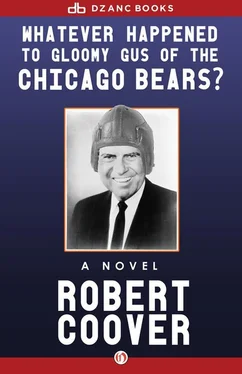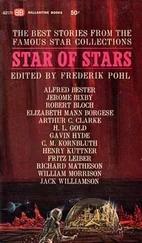Robert Coover - Whatever Happened to Gloomy Gus of the Chicago Bears?
Здесь есть возможность читать онлайн «Robert Coover - Whatever Happened to Gloomy Gus of the Chicago Bears?» весь текст электронной книги совершенно бесплатно (целиком полную версию без сокращений). В некоторых случаях можно слушать аудио, скачать через торрент в формате fb2 и присутствует краткое содержание. Год выпуска: 2014, Издательство: Dzanc Books, Жанр: Современная проза, на английском языке. Описание произведения, (предисловие) а так же отзывы посетителей доступны на портале библиотеки ЛибКат.
- Название:Whatever Happened to Gloomy Gus of the Chicago Bears?
- Автор:
- Издательство:Dzanc Books
- Жанр:
- Год:2014
- ISBN:нет данных
- Рейтинг книги:4 / 5. Голосов: 1
-
Избранное:Добавить в избранное
- Отзывы:
-
Ваша оценка:
- 80
- 1
- 2
- 3
- 4
- 5
Whatever Happened to Gloomy Gus of the Chicago Bears?: краткое содержание, описание и аннотация
Предлагаем к чтению аннотацию, описание, краткое содержание или предисловие (зависит от того, что написал сам автор книги «Whatever Happened to Gloomy Gus of the Chicago Bears?»). Если вы не нашли необходимую информацию о книге — напишите в комментариях, мы постараемся отыскать её.
Whatever Happened to Gloomy Gus of the Chicago Bears? — читать онлайн бесплатно полную книгу (весь текст) целиком
Ниже представлен текст книги, разбитый по страницам. Система сохранения места последней прочитанной страницы, позволяет с удобством читать онлайн бесплатно книгу «Whatever Happened to Gloomy Gus of the Chicago Bears?», без необходимости каждый раз заново искать на чём Вы остановились. Поставьте закладку, и сможете в любой момент перейти на страницу, на которой закончили чтение.
Интервал:
Закладка:
It was a long day. The heat and the glare didn’t help, the sweat, the short tempers. It was like those long July days out in San Francisco three years ago during the dock strike, only grittier. Leo noticed it, too. They’d brought out the National Guard in San Francisco with machineguns and rifles, and Leo worried about it happening here. It made him feel tempted to side with the hotheads, go now and get the jump on them. He hated all those scabs in there, knew a lot of them were ruthless armed hoods, could even see the propaganda value in provoking them. And he was upset about his UAW friends Frankensteen and Reuther, who’d been badly beaten Wednesday up in Dearborn by a goon squad hired by Ford. Plainclothes cops, it was rumored: someone saw a badge, or handcuffs. “Where is Richie,” Leo had remarked wryly, “now that we need him?” He was referring to San Francisco again, 1934. After a dozen good men had been shot out there on Bloody Thursday, Blaine had caught a scab trying to sneak off the company ship for a rendezvous with his girlfriend, had made some buddies hold the scab’s legs across a curb, and had jumped up and down on them. Richie is now a commissar with the Lincolns in Spain, we’ve heard. And that was another thing. The dusty field between us and the mills with its scraggly marsh grass and stunted shrubs looked too much like the pictures we’d seen of the country around Madrid. It looked like a place where people went to die. About a week after the bombing of Guernica, I’d got it in my head that Maxie had been killed. It was stupid, I had no reason for it, he probably wasn’t even in Spain yet. And I distrust all premonitions, hate such rubbish as precognition and mental telepathy (one of my aunt’s more appalling quirks: needless to say, she went running to the old folks’ home screaming that my uncle was dead about ten times before he finally kicked off — and that day she was happily playing bridge with her North Lawndale cronies). In my case (as in hers), a projection of guilt, I supposed. But still I couldn’t shake off the feeling that Maxie was dead. And it was with me like some kind of morbid affliction all day Friday.
Toward sundown, the sky behind the plant reddening like a taunt, Leo got a report from a guy named Bill, who’d also been helping him (“He’s okay, he’s got good calluses,” Leo explained), that there was a group planning to march on the plant as soon as it got dark. Bill estimated there were about a hundred of them, but that they’d take others with them. He said he’d tried to talk them out of it, as Leo had asked, but they’d got pretty hostile toward him, accusing him of being a lackey and a company fink. A lot of the local workers had drifted away around suppertime, the women and children as well, the crowd was becoming increasingly hard-core, many of them from out of town, and, as Bill pointed out, there was now a lot more drinking going on. This was true, I’d noticed it myself. Several members of the organizing committee had left by now as well, and I could see that Leo was seriously considering joining the exodus. He argued with individuals that a march on the plant now would serve no purpose at all, that it would only give the police an opportunity to beat up and arrest a lot of men we would need on Sunday, and that it might even give the authorities an excuse to bring in enough force to make the Memorial Day demonstration impossible. As individuals, they all tended to agree with him, but as a group they still seemed determined to march. They wanted something to happen, they didn’t care what. “Ah well, it’ll give us something to talk about on Sunday, I guess,” he said finally, turning to a guy with a bottle. “Lemme have a swig of the people’s cornjuice, Smitty.” He took a deep suck on the bottle, handed it to me with an airy wheeze. “Have a bracer, Meyer,” he said with a crooked smile, barely visible now in the deepening dusk, “and get ready for history.”
By the time we’d formed up outside Sam’s Place, there were nearly a thousand of us, and Leo, ever the pragmatist, had not only by now accepted the inevitable, he was even helping to organize it. Instead of marching straight across the rough field where we might stumble and fall in the dark, we headed south down Green Bay Avenue, keeping the field on our right. There was still a faint glow on it, as if the bright day had left a residue, as in phosphorescent rock. It looked mysterious, almost otherworldly. Leo had put me on the right flank, near the guy named Smitty, whom we’d both come to suspect of being a police plant and agitator (maybe it was the lethal quality of his booze that had given him away), and told me to keep an eye on him while he took the other flank. At 117th Street, we turned west toward the main gate, but we didn’t get far: the police were waiting for us there. It was as though they’d known all along we were coming. Of course we’d been shouting a lot in the dark echoey night, and a couple of cops had got pushed aside further up the street, it was hardly a secret. But even before we’d reached them, they seemed to be in our midst. That was when I got my black eye, and a bruise or two elsewhere besides. It was pitch-dark and there was a lot of confusion, fists and clubs flying, bricks as well, but I had no doubt who it was who hit me. I’m used to looking at the world through dark goggles, after all, and seeing more than most. I’d been knocked to the ground and was having a hard time getting up. I heard shots being fired, people screaming. It was Bill and Smitty who rescued me, dragging me away from the melee, upfield toward Sam’s Place. The strikers were quickly routed by their own confusion, but a lot of heads got broken first. Some would need a hospital. The vanguard especially took a beating, but Leo, as I knew he’d be, was all right. “Sorry, Meyer,” he said when he saw me, and as far as I could tell, he truly was.
“Bill,” I said.
“That sonuvabitch…”
“Bill and Smitty.” They’d disappeared, of course, ostensibly to hurl themselves back into the fight, but it was clear they’d used me as the means to their own withdrawal. I’d seen them push the men in front off balance and into the police, then, yelling curses all the while at the cops (these were ritual phrases, repeated woodenly like recognition signals), start laying about wildly, as though fighting off unseen monsters. And it was Bill who, glancing over his shoulder to take aim, had laid me out with his elbow. If it was his elbow. Felt harder than one. It might have been about then, sprawling in the dirt and getting kicked and stepped upon in the night-dark turmoil, that I began to feel I might be able to live with myself if I didn’t after all make it to Spain. Amazingly, some of these guys do this sort of thing every Saturday night just for fun; I prefer a little music on the radio and a handful of soft clay.
The next day Leo let a rumor start circulating that the committee had identified at least five company spies in their midst, and that they would be “dealt with” by all the comrades after sundown. “Bill” and “Smitty” (we no longer supposed those were their real names) were occasionally mentioned. They kept up a good front through the afternoon, but by sundown they had cleared out. Along with seventeen others. “Thanks, Meyer,” Leo said, and sent me home.
It’s still chilly and overcast, but the rain’s stopped by the time I reach my street in Old Town. In the school playground a block or so before my studio, boys are playing a ballgame. Other times of the year, it would be football or basketball, today it’s baseball: the Cubs versus the White Sox, about five to a side, they’re taking names like Billy Herman and Luke Appling, Dixie Walker, Jimmy Collins. Both teams — the real ones — are having good seasons, fighting right now for second place in their respective leagues, so the boys have a lot of pride in being who they are. The kid pitching for the White Sox five is, not surprisingly, calling himself Bill Dietrich, that down-and-outer the Sox picked up earlier this year on waivers who astonished everyone this week with his unlikely no-hitter. The kid even wears glasses like Dietrich, maybe that’s why they’ve let him pitch.
Читать дальшеИнтервал:
Закладка:
Похожие книги на «Whatever Happened to Gloomy Gus of the Chicago Bears?»
Представляем Вашему вниманию похожие книги на «Whatever Happened to Gloomy Gus of the Chicago Bears?» списком для выбора. Мы отобрали схожую по названию и смыслу литературу в надежде предоставить читателям больше вариантов отыскать новые, интересные, ещё непрочитанные произведения.
Обсуждение, отзывы о книге «Whatever Happened to Gloomy Gus of the Chicago Bears?» и просто собственные мнения читателей. Оставьте ваши комментарии, напишите, что Вы думаете о произведении, его смысле или главных героях. Укажите что конкретно понравилось, а что нет, и почему Вы так считаете.












